 We’ve all known for a long time that TV as we knew-and-loathed-it was under pressure, as people discovered there were things more rewarding in their lives than passively sitting in a darkened room, being bathed in light from a box in the corner of the room, watching whatever the channel controller decided to ‘entertain’ them with.
We’ve all known for a long time that TV as we knew-and-loathed-it was under pressure, as people discovered there were things more rewarding in their lives than passively sitting in a darkened room, being bathed in light from a box in the corner of the room, watching whatever the channel controller decided to ‘entertain’ them with.
In a rather self-serving survey, “Digital Gaming in America”, Ziff Davis Media attempts to further fan the flames of this long lasting discussion, as they reveal that video gamers are watching less TV than they did previously, and will continue to reduce the amount they are consume.
Before you run to your boss, waving a printout of this story in your hand, proclaiming the near-death of TV. The results of the survey do reflect the general trend of what is happening, but do bear in mind the size of survey – 1,500 households (ie people who happened to be in, answered the phone, and had nothing better to do than answer a series of questions), compared with 295m people that live in America isn’t what you’d call statistically robust.
What did they find? About a quarter reduced their TV watching over the last year, with about a further fifth planning to do the same in the coming year. To put some hours against that, they estimate that there’s been a two hours per week drop over the last year to 16 hours a week this year, around a 10% drop.
The wolf isn’t quite at the door of TV. Looking at the hours/week, the reduced figure is still over 2.25 hours of TV a day, quite considerable when you consider what other task people do for that period of time, beyond working and sleeping.
 In 2003 the BBC did some far more interesting research in this area. Of course they found that numbers of hours watched dropped, but what we found significant was that those hours that were being spent in front of the TV, weren’t dedicated to watching it.
In 2003 the BBC did some far more interesting research in this area. Of course they found that numbers of hours watched dropped, but what we found significant was that those hours that were being spent in front of the TV, weren’t dedicated to watching it.
This was particularly true of the younger viewers (34 and under) who were doing other things – texting their friends, Web browsing, talking on the phone, playing games on portable games systems – while in front of the box. They would dip in and out of the TV programme as it was on, occasionally letting it grab their attention – treating it far more like radio. It doesn’t take a great deal of imagination to figure that their attention would be elsewhere during the advert breaks.
Where the Ziff Davis survey does become more interesting is looking at gaming on mobile phones, particularly as this report is US-centric and the market isn’t very mature. A surprising 42% of surveyed gamers had bought games for their phones, and that they’d spent an average of US$13 (~€10, ~£7) each over the last three months.
An additional surprise for us was the length of time the games had been played on the mobile phones – 19 minutes per gaming session. Given the size of the display and general difficulty of playing games on such restricted controls, this is a revelation.
The split of games played was Arcade (57%), Card (44%) and Puzzle (37%) – another suprise for us given the device’s restrictions mentioned in the paragraph above. We suspect that the dominance of arcade games will reduce as players realise thinking games will be more rewarding than twitching with little buttons.
Oh … by the way Ziff Davis just happen to publish the games magazine, Electronic Gaming Monthly, Computer Gaming World, Official U.S. PlayStation Magazine and 1UP.com – and their ad sales people are just sitting there waiting to hear from you if you want to shift your advertising budget from TV to their mags.
Ziff Davis Video Game Survey: Gamers Continue to Cut TV Viewing
BBC – TV’s Tipping Point: Why the digital revolution is only just beginning
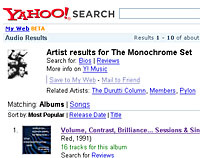 Yahoo is testing a new Audio search facility to let users find audio files on the Web.
Yahoo is testing a new Audio search facility to let users find audio files on the Web.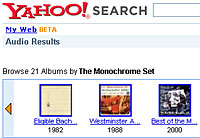 Although the service is still in beta we were impressed with its speedy and simple interface: typing in the name of one of my (sadly) obscure old punk songs immediately brought up the album details, a list of download locations and links to reviews and other released albums.
Although the service is still in beta we were impressed with its speedy and simple interface: typing in the name of one of my (sadly) obscure old punk songs immediately brought up the album details, a list of download locations and links to reviews and other released albums. Almost a fifth of US consumers have admitted falling victim to identity theft, with younger adults at greatest risk, according to new figures.
Almost a fifth of US consumers have admitted falling victim to identity theft, with younger adults at greatest risk, according to new figures. Experian-Gallup found that around two-thirds of consumers who have yet to experience identity theft felt that it was unlikely to happen to them, with only six per cent taking the precaution of purchasing some form of identity theft protection.
Experian-Gallup found that around two-thirds of consumers who have yet to experience identity theft felt that it was unlikely to happen to them, with only six per cent taking the precaution of purchasing some form of identity theft protection. The Mozilla Foundation has released a technology preview of a mobile-phone browser, based on the same code that powers the popular Firefox browser.
The Mozilla Foundation has released a technology preview of a mobile-phone browser, based on the same code that powers the popular Firefox browser. Hackers have made chumps out of Microsoft, successfully bypassing their Windows Genuine Advantage (WGA) Programme only days after the anti-piracy scheme was activated.
Hackers have made chumps out of Microsoft, successfully bypassing their Windows Genuine Advantage (WGA) Programme only days after the anti-piracy scheme was activated. Figures from the Mobile Data Association (MDA) reveal that U.K. mobile phone users sent an astonishing 2.6 billion text messages in June.
Figures from the Mobile Data Association (MDA) reveal that U.K. mobile phone users sent an astonishing 2.6 billion text messages in June. Online broadband film distributer, and latterly video content provider CinemaNow, has announced that they will be carrying some high-definition from HDNet on their Internet to PC delivery platform. It’s the first time that HDNet’s content has been made available on-demand through an online broadband service.
Online broadband film distributer, and latterly video content provider CinemaNow, has announced that they will be carrying some high-definition from HDNet on their Internet to PC delivery platform. It’s the first time that HDNet’s content has been made available on-demand through an online broadband service. Mark Cuban, the CEO of HDNet, has been slowly gathering HD content to the point where HDNet now lay claim to having more original high-definition content than any other network. We at Digital-Lifestyles.info have had our eye on him for years, as we think he’s a smart cookie. He not only spots upcoming trends, but turns them into businesses. He made a fortune when he sold broadcast.com to Yahoo for billions of dollars at the peak of the market.
Mark Cuban, the CEO of HDNet, has been slowly gathering HD content to the point where HDNet now lay claim to having more original high-definition content than any other network. We at Digital-Lifestyles.info have had our eye on him for years, as we think he’s a smart cookie. He not only spots upcoming trends, but turns them into businesses. He made a fortune when he sold broadcast.com to Yahoo for billions of dollars at the peak of the market. Amazon.com’s revenue soared internationally in the second quarter as electronics and other non-book bits’n’bobs made up more of its business.
Amazon.com’s revenue soared internationally in the second quarter as electronics and other non-book bits’n’bobs made up more of its business. Amazon.com’s chief financial officer, Tom Szkutak, announced that third-party sales accounted for 28 percent of Amazon.com’s total items sold, sprightly stepping up from 24 percent for this time last year.
Amazon.com’s chief financial officer, Tom Szkutak, announced that third-party sales accounted for 28 percent of Amazon.com’s total items sold, sprightly stepping up from 24 percent for this time last year. This includes US$56 million (~£32.25m, ~€46.6m) in income tax expense, which was up from US$5 million (~£2.87m, ~€4.16m) a year earlier.
This includes US$56 million (~£32.25m, ~€46.6m) in income tax expense, which was up from US$5 million (~£2.87m, ~€4.16m) a year earlier. Illegal music downloaders shell out more for legitimate music downloads than goody two-shoes music fans.
Illegal music downloaders shell out more for legitimate music downloads than goody two-shoes music fans.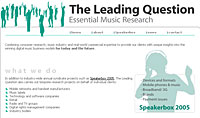 How much both groups spend on CDs wasn’t specified.
How much both groups spend on CDs wasn’t specified.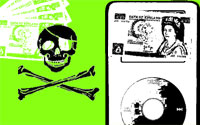 Respondents cited built-in cameras, organiser functions and video cameras above music players in their preferences for mobile phone features.
Respondents cited built-in cameras, organiser functions and video cameras above music players in their preferences for mobile phone features. Sony Whips Out A White PSP
Sony Whips Out A White PSP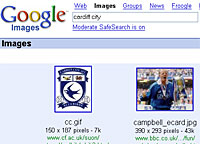 Google Grabs 47% Of All Searches Online
Google Grabs 47% Of All Searches Online A British court has fined a man £500 ($870, €720) for using a residential wireless broadband connection without permission.
A British court has fined a man £500 ($870, €720) for using a residential wireless broadband connection without permission.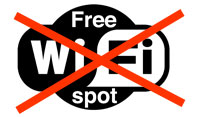 We have to say this seems a little harsh as there appears to be no evidence that there was any hostile motive behind his actions.
We have to say this seems a little harsh as there appears to be no evidence that there was any hostile motive behind his actions. Champagne corks were firing off at Google like a military salute as the Internet search engine kings revealed that their profits had jumped more than 300 per cent in the second quarter this year.
Champagne corks were firing off at Google like a military salute as the Internet search engine kings revealed that their profits had jumped more than 300 per cent in the second quarter this year. The company’s fortunes are currently on a stratospheric trajectory, with April’s first-quarter profit almost six times higher than a year earlier.
The company’s fortunes are currently on a stratospheric trajectory, with April’s first-quarter profit almost six times higher than a year earlier.